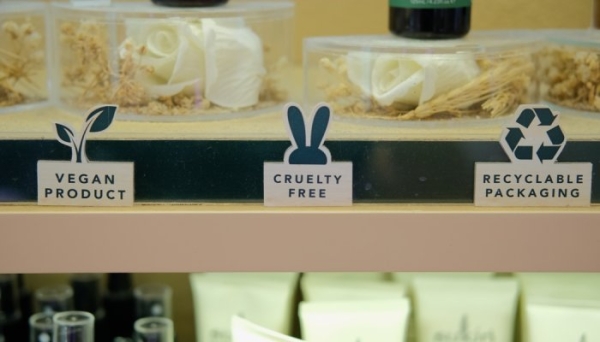 s=”img-responsive post-image” width=”700″ height=”400″ alt=”Sustainability and ethical labels still mushrooming in the cosmetics industry” />
s=”img-responsive post-image” width=”700″ height=”400″ alt=”Sustainability and ethical labels still mushrooming in the cosmetics industry” />
The number of sustainability schemes and ethical labels in the cosmetics industry is increasing. Ecovia Intelligence sees growth in the number of schemes and labels as well as adoption rates, however there are significant regional variations.
Sustainability schemes and ethical labels continue to spread across the cosmetics industry worldwide, found a recent research by Ecovia Intelligence. In terms of adoption rates, natural & organic labels lead, with COSMOS and NATRUE being the leading standards. There would be about 45,000 natural or organic certified products in the global cosmetics industry today. While there are certified brands all around the world, the adoption rate of natural and organic labels is highest in Europe, where there are over 20 different standards.
Vegan and vegetarian labels have shown the highest increase in recent years. The Vegan Society has the largest number of certified products: 34,556 cosmetic products now carry its Vegan trademark. The Body Shop is one of its largest backers, getting all its 1000 plus range certified this year. Following its success in the food industry, the V-label (The European Vegetarian Union) is also certifying cosmetics as vegan and vegetarian.
In North America, labelling schemes representing health concerns are the most popular. The Environmental Working Group (EWG) has almost 2,400 verified cosmetic products. Its standard is based on the Skin Deep database which assesses and compares the safety of cosmetic products. The Non-GMO Project and Made Safe labelling schemes are also gaining traction. The former has been adopted by 60 brands most of which have natural and organic cosmetics.
A growing number of sustainability schemes represent lower environmental impacts. The Nordic Swan and the EU Eco Flower are the leading ones for cosmetic products, with the highest adoption rates in northern Europe. Green Seal and Global GreenTag are popular in North America and Australasia respectively. These sustainability schemes are usually based on undertaking life-cycle analysis of products.
Cruelty-free labels are highly evident in Asia and North America. The People for the Ethical Treatment of Animals (PETA) has the Beauty Without Bunnies programme which certifies cosmetics products not been tested on animals. Over 6,000 cosmetic brands are part of the programme. The Leaping Bunny label of Cruelty-Free International is also popular. Almost 2,400 cosmetic brands have adopted the Leaping Bunny certification scheme.
However, the global trend could be curtailed by regulations. The European Commission’s Green Claims Directive, in particular, aims to make brands substantiate any green claims they make. The directive plans to control the number of ethical labels in the cosmetics industry; new labels can only be introduced if they can prove they are better than existing ones. Could rationalization now be on the horizon?
|
Sustainability schemes and ethical labels will be featured at the upcoming Sustainable Cosmetics Summit. An update will be given on the leading schemes, including discussions on pending regulations and future outlook. Representatives from COSMOS, NATRUE, The Vegan Society, V-Label, Ecolabelling Denmark (Nordic Swan and EU Eco Flower), and the European Commission will be participating at the event. The 16th European edition will be hosted at the Crowne-Plaza – République Paris on 23-25th October 2024. More information is available from www.sustainablecosmeticssummit.com/Europe/ |
